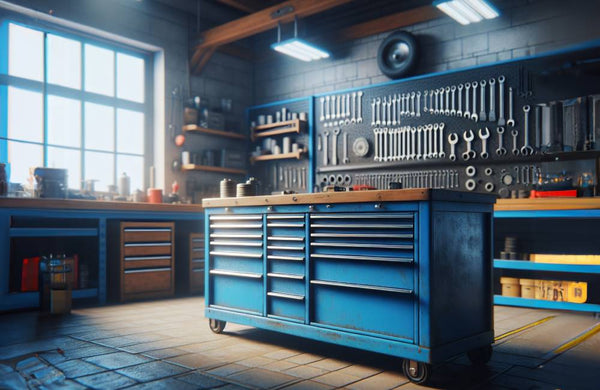Workbenches with Drawers for Specific Professions

No matter what you do for a living, having an organized workbench just makes life easier. When the drawers are laid out the right way, you're not constantly digging through random piles - everything you need is right where it ought to be. Less mess, less wasted time hunting for your favorite wrench (or that one elusive tube of paint), and a lot more focus on the stuff that actually matters.
But let's be honest, not every workbench is cut out for every job. A carpenter doesn't need the same setup as a jewelry maker, and trying to cram everyone's needs into the same design is just asking for headaches. The real trick is finding a workbench with drawers that actually fit, down to the last detail, what you're trying to do.
Workbenches for Artists and Craftsmen
For artists and hands-on makers, the workbench isn't just some spot to stash tools. It's basically part of the art itself - one wrong layout and the whole vibe gets thrown off. Shallow drawers are a must for brushes, pencils, and that collection of paints that always seem to roll away at the worst time. Being able to open a drawer and see everything laid out is better than rooting around in a deep bin and losing your momentum.
The top of the bench matters, too. Choose something that won't stain or turn into a sticky mess if you spill turpentine or paint, because let's face it, accidents always happen. And small touches make a difference: a built-in easel, adjustable lights, spots for mixing palettes - these little details separate a true DIYer’s bench from just some flat surface with drawers.
The key? Customization. No two craftspeople work the same way; everyone's got their quirks and preferred setup. When you can adjust a bench to fit your methods, it feels less like sitting down to work and more like stepping into your own creative zone.

Workbenches for Mechanics and Technicians
If you work as a mechanic or technician, you know workbenches aren't just tables - they're your base. Drawers have to take a beating. Heavy power tools, boxes of fasteners, the occasional dropped wrench - if those drawers aren't solid, you're replacing them in no time. Reinforced builds, smooth tracks that don't grind or catch, and a weight limit that actually means something. That's non-negotiable if you don't want drawers sagging or failing after a busy week.
Then there's the whole security issue. Tools walk away if you give them the chance. Lockable drawers or cabinets are pretty much required if you've got mechanic tools you want to keep to yourself. It's not just about losing money; sometimes it's hours spent tracking down a missing socket set. A decent lock cuts that drama.
Mobility's another factor. Maybe you need a rolling workbench because you're always moving around the workshop, or sometimes the job comes to you. Mobile benches are good for that, but if you're usually knee-deep in big, fussy projects, it's hard to beat a rock-solid, bolted-down workbench. You park yourself there, and everything you need just stays put.
Don't forget about organization. Pegboards, hooks, bins - even power strips built right in make a world of difference. You spend less time fishing around or untangling cords and more time actually getting work done. Nobody misses the clutter.
Workbenches for Researchers and Scientists
In this case, the bench has to survive more than thumps and dings: harsh chemicals, the occasional spill, sometimes even heat or flames. Cheap hardware just doesn't hold up. You need something that won't start corroding, melting, or giving off weird reactions after a week.
Instrument storage matters a lot more in labs, too. You can't just toss a microscope or a set of precision balances in a bin. Those drawers need real protection: soft liners, dividers, sometimes even temp control, because a little jostling or heat shift means unreliable data. If the drawer's wrong, things break or test results go sideways.
Modern labs basically run on electronics, so the bench should have proper power outlets, data ports, maybe even lines for gas or vacuum built straight in. No one wants to juggle a dozen adapters or drag extension cables across the floor just to run an experiment.
Finally, ergonomics - after hours at a bench, it's not negotiable. Benches that adjust in height, have padding where you lean, maybe even wrist supports. These make a long day less of a grind. Ignore comfort, and before long, someone winds up nursing a strained neck or aching back. The well-designed lab benches? They take the edge off, even when the work is brutal.

Workbenches for Medical Professionals
If you're working in a hospital or clinic, you know the rules: those workbenches need to shrug off bacteria, constant cleaning, and whatever else the day throws at them. Forget textured wood-medical benches are all about smooth, non-porous materials that don't give germs anywhere to hide. It's not just about looking spotless; it has to actually be spotless, because the stakes are too high for anything less.
Drawers aren't just for stashing random stuff, either. In a real medical setting, you want those drawers cut up with dividers, every syringe or bandage in its spot - not tossed together - because when something critical happens, fumbling for supplies isn't an option. Bandages, medications, surgical tools; it all needs a place, and it needs to stay put.
And let's talk mobility. Sometimes that table has to move fast. Emergencies crop up, or maybe you just need extra workspace on the fly. If the workbench is a beast to lug, it's in the way. Locking wheels, lightweight build, but no wobble. That's the sweet spot. Security matters, too, especially when medications start getting involved.
Customization vs. Pre-Made Options
You've basically got two paths: hunt down a pre-made bench that "mostly" fits the bill, or have one made exactly how you want it. Pre-mades can be great - someone probably already figured out the right surface material, drawer setup, or let's be real, even the right color for your line of work. But you'll always hit a wall with something that bugs you.
Custom? You call every shot. Need deeper drawers for weird-size supplies, or a certain finish that stands up to bleach for the hundredth time? No problem. Sure, it means wrangling with a craftsperson, more back-and-forth, maybe a bigger price tag, but you get what you want. And sometimes, that's what it takes to make the workspace actually work.
Conclusion
Workbenches aren't one-size-fits-all. Medical, mechanic, artist - anyone serious about their craft needs something designed for the chaos they actually face. Drawer space, surface, features that don't sound exciting until you really need them - all of it matters more than anyone outside your job realizes. Getting it right? It won't make your job perfect, but it'll make the hard days a little less hard. That's saying something.



